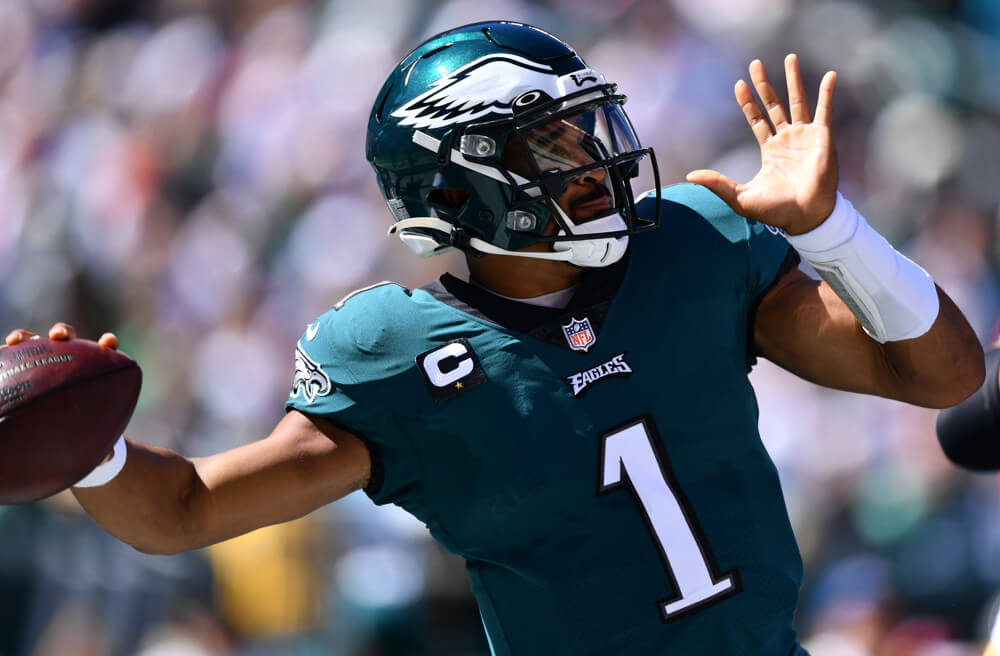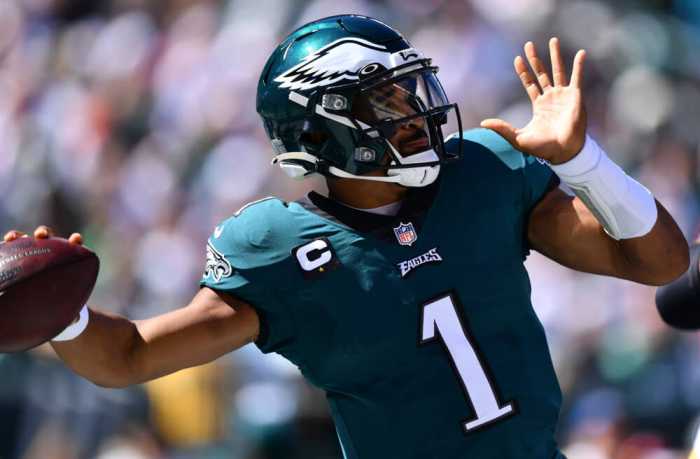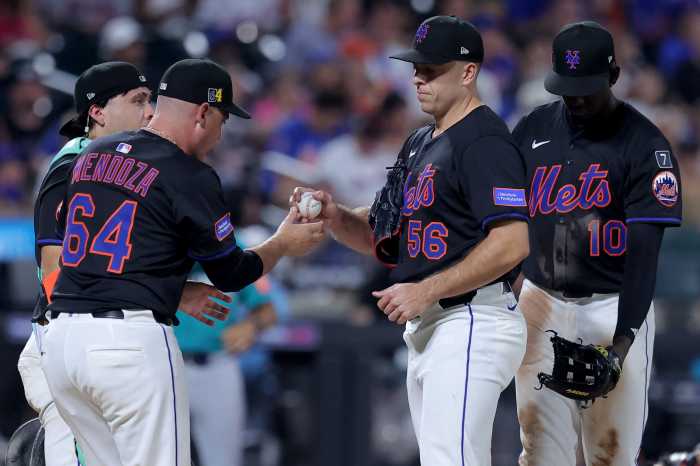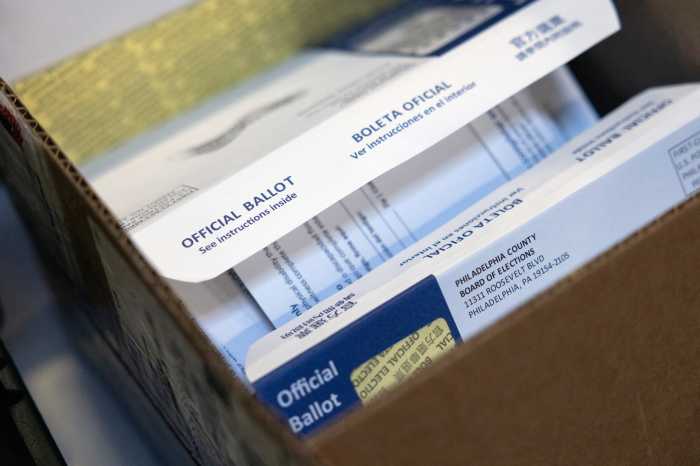The conversation surrounding the future of the quarterback situation for the Philadelphia Eagles has been buzzing all season long. Fans and media have questioned whether Jalen Hurts will be the long-term starter who leads the Eagles back into Super Bowl contention. The organization has passed up multiple opportunities to verbalize any kind of commitment.
Hurts, a 2020 second-round draft pick, has started 12 games in 2021. He has shown tremendous athleticism, strong leadership qualities, and some flashes of effective passing while also making his fair share of mistakes. He certainly hasn’t looked out of place in the NFL this season, but the history of the franchise (for better or for worse) indicates that the Eagles will aggressively pursue an upgrade at the “most important position in sports.”
1. Franchise QBs with Second-Overall Picks: McNabb, Wentz
Andy Reid began his head coaching tenure in Philadelphia in 1999. After a 3-13 season in 1998, the Eagles held the second-overall pick in the NFL Draft. Reigning Heisman trophy winner Rick Williams looked like an unquestionable NFL star there for the taking.
The Eagles had other ideas. They had recently failed to replace Randall Cunningham with lackluster quarterback options like Bobby Hoying, Rodney Peete, and Koy and Ty Detmer early in Jeffrey Lurie’s ownership tenure. The team bypassed Williams and selected Donovan McNabb, much to the chagrin of the few Philadelphia fans in attendance, as their foundational piece to lead the new era of Eagles football. The move paid tremendous dividends for McNabb, Reid, and the organization.
The Eagles followed their own blueprint when they hired Doug Pederson, a disciple of Reid, and made a monstrous commitment to make sure he began his tenure with another foundational signal-caller drafted with the second overall pick.
General manager Howie Roseman maneuvered from the 13th overall pick with two trades that put him in position to select Carson Wentz. The Eagles lost veterans Byron Maxwell and Kiko Alonso and five draft picks to acquire the pick to select Wentz and one future fourth-rounder. They valued their organizational blueprint with the QB as the foundation, and they followed through with a blockbuster sequence of moves to commit confidently to what they expected to work.
2. Nick Foles Out, Nick Foles In
Just like they haven’t expressed a long-term commitment to Hurts, the Eagles never tied themselves to Nick Foles after he put up an impressive stat line of 27 touchdowns and two interceptions in 10 starts in 2013. The former third-rounder went 6-2 as a starter in 2014 before suffering a season-ending injury, but his play underwhelmed the organization. They traded Foles and two draft picks during the 2015 offseason for Sam Bradford and a late-round pick.
Foles still had a future with the Eagles though. After two less than spectacular seasons, he returned on a two-year contract entering the 2017 season. The deal was expected to be for $11 million, an already lucrative deal for a backup, but he ended up earning about $16 million by meeting contract incentives. The acquisition of a top-tier backup proved to be the best insurance policy in league history when Foles led Philadelphia to victory in Super Bowl LII.
3. The 2015 Offseason
Former head coach Chip Kelly led an overly aggressive roster overhaul during the 2015 offseason, and moving Foles was only part of the plan. The Eagles used the rationale of acquiring a player with a supposedly higher ceiling as a franchise QB in Bradford, and they even pursued a blockbuster trade after acquiring him.
Rumors swirled for months about Kelly’s attempts to trade up in the first round of the draft to select Marcus Mariota, his former QB at the University of Oregon. The move never materialized, but the furious effort indicated desperation on the part of the Eagles to find their franchise QB. The Eagles ultimately dodged a bullet that would’ve changed the course of franchise history in remarkable ways.
4. Financial Investment in Backup QBs
Roseman invested $32 million in the backup QB position in four seasons between 2016-19. Chase Daniel signed with Philadelphia in March 2016 for three years and $21 million. He didn’t see the end of the contract, but Pederson and Roseman continuously complimented the journeyman for mentoring Wentz during his rookie season with input in the QB room. He only attempted one pass with the Eagles.
The spectacular success of Foles in 2017 and 2018 justified a continued investment in backup QBs. Nate Sudfeld made over $3 million in 2019, and the Eagles still felt it necessary to sign Josh McCown while Sudfeld dealt with a short-term injury.
Joe Flacco signed a one-year deal with the Eagles worth $3.5 million entering 2021 season. Roseman capably maneuvered by acquiring Gardner Minshew as a cheaper, more suitable backup and moving Flacco ahead of the trade deadline to recoup comparable draft capital to what he sent away for Minshew.
5. Draft Picks Building a “Quarterback Factory”
Roseman drafted Hurts with the expectation that a capable backup on a rookie contract would eliminate the lucrative financial investments in veteran backups. He spoke about the organization’s hopes of becoming a “quarterback factory” after he made the pick. His words were poorly-timed, and the head-scratching pick played a role in the demise of Wentz as the franchise QB.
Eagles fans will always remember the controversial Hurts pick, but they might not remember how Roseman mishandled another QB pick the previous season. He selected Clayton Thorson in the fifth round in 2019. The former Northwestern signal-caller failed to make the team during his rookie training camp, and he never made it to the Eagles practice squad. The Dallas Cowboys nabbed him, likely with the hopes of sabotaging one of only five draft picks made by their division rival in 2019.
Jalen Hurts is a good football player with a long-term future in the NFL, and first-year head coach Nick Sirianni has found ways to develop strong game plans that focus on the running game and play to the strengths of his second-year QB.
However, if history has taught us anything, Lurie, Roseman, and the organization will invest their resources heavily and pursue a QB with a ceiling in the company of the elite players in the NFL after the “transition point” season in 2021 concludes. Expect the Eagles to explore every possible QB candidate to select with one of their three first-round picks. Expect them to pursue big-named veterans like Russell Wilson, DeShaun Watson, and Aaron Rodgers to become their franchise QB.
Photo by Kyle Ross/Icon Sportswire

























